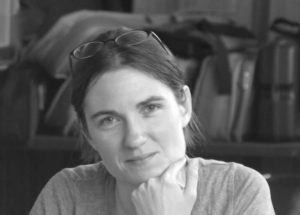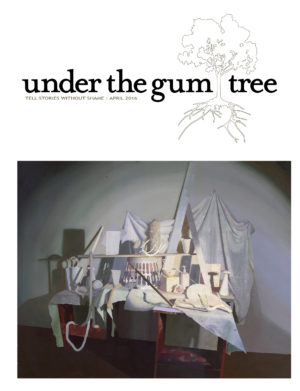Emily W. Blacker

Emily W. Blacker lives in New York City and works as a tutor primarily for students with learning disabilities. She is also a writer of creative nonfiction, fiction, and songs. Her work has appeared in the book Voices of Diversity: Stories, Resources and Activities for the Multicultural Classroom and has received Honorable Mention in Glimmer Train. She is currently enrolled in the low-residency MFA in Writing program at Vermont College of Fine Arts.
When did you start writing and why? What inspires your writing now?
I started writing stories when I was quite young to explore and get lost in my imagination. Eventually, writing became a way for me to interpret, claim, and ultimately transform my experience. My mind is completely absorbed in an almost meditative way when I’m writing, so I find it to be a respite from the challenges of daily life. What inspires me most is the potential to make a meaningful connection with others. As an avid reader, I know what it is to feel awakened, validated, and changed by the power of a story. When I write, I hope that my words will offer a bit of that experience to someone else.
You interweave two story lines together in the piece. What prompted this decision and what do you think this style adds to the piece?
I started out wanting to write an essay about the concept of adolescent melancholy and how sadness is sometimes romanticized. While exploring that idea, the story of Lucy and the story of Eliza emerged as key experiences in my life. When I looked at them side-by-side, I realized that there were some compelling connections. In high school, I seemed like a dark, somewhat remote person, but I expressed my struggles through writing poetry, and I believe that writing saved me in many ways. By contrast, my student Eliza appeared happy. When she took her own life, I spent a lot of time reviewing my memories looking for evidence of her sadness. From my limited view as her English teacher, it seemed that she did not or could not express her pain in words. Ultimately, I had to accept that I might never truly understand the why of what she did. Juxtaposing the two stories allowed me to see each one more clearly, and this helped me to draw a line between myself as a melancholy teen and myself as a teacher confronted with the destructive nature of unexpressed adolescent pain. I think this juxtaposition evokes how we try to use our own experience to understand the mystery of others, and how that attempt often fails.
Throughout the narrative, you act as primarily an observer, was this a conscious decision?
I think this is mainly a reflection of how I experience the world. I tend to be more of an observer than an actor. I’m someone who really needs time to step back and reflect before engaging. When I write scenes from my life, I often position myself as an observer simply because that is who I was in that moment, and who I continue to be. I suspect that many writers might relate to this.
The piece deals with the emotional turbulence that comes with adolescence and finding yourself. Why do you like writing about this period in our lives?
Working with adolescents has given me a real appreciation for the collision of heightened emotion and identity-formation that occurs during that time of life. I vividly remember hiking to the top of a mountain when I was a teenager, looking out over the world below, and thinking it was the most magnificent, magical experience of my life. Years later, I climbed up another mountain and, while I appreciated the beauty of the vista, the experience felt significantly less meaningful. The charged energy of adolescence is what makes it so rich with meaning and the stuff of great stories. I believe it is important to reflect on that time in our lives in order to understand the foundations of our being. Stories from adolescence are origin stories.
How did your relationship with Lucy shape the rest of your adolescence?
My relationship with Lucy had a profound impact on me. She was not only my best friend and first love, but the first person with whom I explored my same-sex attraction. I have come to understand that we were both trying to navigate the confusion of sexual identity and that often we hurt others when we are not ready to confront the truth within ourselves. Though it was painful, I am grateful for my relationship with Lucy. She was an integral part of my growing up, someone who taught me both who I am and who I’m not, what it means to love and what it means to lose, and how to move on.
Many coming of age stories examine the theme of lost innocence. Do you feel that this is true of “Love Her, Briefly” and in what ways?
Yes, lost innocence is central to this story. As a teenager, heartbreak altered my notions of love. As a young teacher, losing a student rattled my faith in the accuracy of my perceptions. But to me, the key loss of innocence in this story is around the idea of melancholy. The story is about losing the naive belief that sadness and depth/beauty are always integral to each other. As a teenager, I drew a line between sadness and beauty to make meaning of my sense of isolation. I wanted to be a writer and I gleaned from literature that suffering was the foundation of art. Certainly, there is truth to this, but it is not the only truth. As I got older I realized that while suffering can be transformed into beauty, it is not necessary for beauty. In fact, true emotional pain is often the opposite of beauty—it can be horrifying and violent. For me, part of growing up was about allowing myself to pursue joy. I still experience melancholy, and I still draw meaning from it, but I no longer see it as the only condition of profundity.
Are these still uncomfortable memories for you? What made you decide to finally put these experiences into words and show it to others?
There is still a certain discomfort in these memories and I imagine there always will be. I suppose I wanted to put these stories into words to explore and challenge that discomfort. While I was writing, I tried not to think too much about the sharing part, and just to stay true to my emotional experience. When it came time for sharing, I did experience a certain anxiety. I think that we are conditioned to contain and protect what is most painful in our lives, so telling personal stories can often feel risky. However, I believe in the power and importance of personal storytelling and I believed in the importance of this story, so I pushed against my fears. I think I am more raw and honest in writing than I am in most other parts of my life, so it is always scary for me to share my writing, but it is also empowering. The constant struggle with those opposing forces is, I think, integral to the experience of writing nonfiction.




